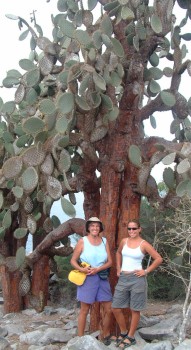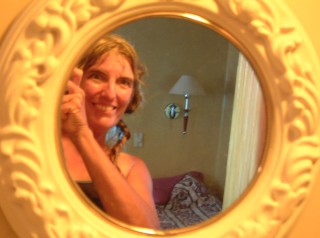
Sue and Amanda, dwarfed by an opuntia cactus in the Galapagos
2003 Ecuador
April 3, 2003, on passage to Manta, Ecuador
Sail Fast, Live Slow. That's the motto on one of Jon's T-shirts, and it certainly is the reality of passage making. We are on day 5 of a 5-day passage from Panama to the mainland of Ecuador, and although we're motoring (boo!) at least the sea is flat and I can get on the computer. When the sea is choppy or with big swells we tend to lie about trying to catch up on sleep, or we're busy with food preps and clean-up. We've modified our watch schedule so that we each take a 1.5 hour watch at the helm (with the wonderful new autopilot on!), then we're off for 4.5 hours. We're pretty accurate on times during the night, but in the day we're more lax. So that no one feels alone on the helm we doss-down on the saloon settee for 1.5 hours after we come off the helm ready to aid the person on watch. In shipping lanes we tend to have 2 people up most of the night, but then there are the glorious times between heavy shipping or fishing areas where we can stand watch, then begin a stretch of 4.5 hours of sleep. Oh, deliciousness!
Well, since Curacao, life has been a whirlwind of sightseeing and playing tourist in between serious bouts of MAJOR provisioning. By the way, my back/hip is back to about 98% great, so I'm doing my share of walking/shopping. What I don't do is lift anything heavier than a book. Luckily there are 3 other strong people to help! So, can you imagine trying to figure out what your family eats in seven months??? (We're hoping not to have to buy much of anything except produce in French Polynesia, Tonga, or the Cook Islands, before American Samoa.) Well, it's tricky, believe me. Add to that the fun (challenge) of having to do all the shopping in unfamiliar stores with unfamiliar products. Chances are we'll be running out of some favorite things and end up with a plethora of others. As for fresh produce, we have nets of fruits and veggies strung from the cockpit bimini and in the galley. While Amanda and I were sorting out the 60 lbs of produce we got at the Panamanian Abasto Mercado, some Kuna Indian women walked by the paseo near the harbor, and I gave them each several green peppers and onions. Now I wish I'd given them lots more. It's a daily chore to sort through the food to see what is off, about to go off, or mashed beneath the sheer weight of other produce!
I'll be writing more later. Right now the kids have to get on the computer to add some history of the Panama Canal condensed from an excellent book "The Path Between the Seas" which we had them read.
May 10, 2003, from Santa Cruz Island, Galapagos, Ecuador
 Sue and Amanda, dwarfed by an opuntia cactus in the Galapagos |
The air is cool and overcast, barely hinting at the possibility of a hot sunny day to come. This is typical garua (misty) season weather for the Galapagos. The cold Humboldt Current encircles the islands creating a cold air layer under the hot equatorial sun, resulting in mist and overcast. After the heat of Panama in March, I am pleasantly surprised to find it cool enough here on the Equator to sleep under a cotton blanket at night.
Sailing on my own boat to the Galapagos has been a long-time dream of mine, and I've found the reality leaves me with a mixture of wonder, surprise, dismay and hope. The wonder comes from the animals here -- yes, they are so unconcerned about people that they virtually ignore us. We've had young sea lions lazing on our sugar-scoops. (We had to put ropes across the steps so they wouldn't just invite themselves into the cockpit and through the companionway!) Birds land on the lifelines to preen or watch for fish. Schools of spotted eagle rays swim beneath the boat.
What surprised me was that once I was here and had seen as much as one is allowed to see by bus, taxi, truck or walking, I wasn't satisfied. I was still hungry to know more about the islands. So we indulged in a 5-day tour on a power boat, complete with naturalist guide. Seeing the Galapagos as most tourists see it -- truly untouched on some islands, and with an abundance of wildlife that puts the anchorage areas to shame--made me realize what a fragile paradise this is. It is not a paradise for people, but for the animals and plants that have evolved here.
Sadly, the human population of these volcanic islands have been raping them for centuries, and continue to do so. Income from illegal fishing, gathering of sea cucumbers, shark fins, and even sea lion penises (for the Asian aphrodisiac market) has attracted a hoard of people from the mainland and overseas who don't care a whit for the environment or preservation of the islands. Even the settlers who are here legally have introduced plants and animals that are devastating the native species. Feral goats, pigs, dogs and cats are destroying the habitats, eating the eggs and young of the endemic birds and reptiles. Introduced plants such as guavas, blackberries, and quinine trees are overgrowing native species or shading and killing them; the result is habitat destruction and food depletion for the animals.
 Self-portrait aboard the Lobo de Mar tour boat |
Luckily the National Park and the Darwin Center (a non-profit scientific organization that formed in 1959, independently, but in cooperation with the Park) are now focusing on these problems. There are massive education campaigns, murals around the four small towns promoting awareness of the fragile environment, and teams of experts sent into the fields to eradicate the goats, rats, etc. It is a long, slow process, and with the rats, an almost hopeless one. One of the biggest problems is uncontrolled immigration to the islands, or I should say, to Puerto Ayora, the main town, situated on Santa Cruz Island. Here, the population has exploded from a few thousand a decade ago to over 15, 000. On the other three islands with settlements the population has been more strictly controlled, and only native Galapaguenos may live there: other Ecuadorians and foreigners are given only 3-month stays. Immigration will only be checked when the authorities stop receiving bribes and more laws are enforced concerning immigration from the continent. But with Ecuador having one of the most corrupt governments in the world (it's been on the Top Ten list, worldwide, for over 30 years), the future is depressing.
Corruption, greed, and lack of education threaten the Galapagos. As a short-term visitor I can't change human nature, but I can help educate. As a cruiser I resented the restriction placed on us to anchor only in designated anchorages. But now that I've been out with a guide to see the untouched islands--even for a few days--I am all in favor of continued restriction on cruising boats. Without meaning to we would do harm by our sheer numbers, our desire to touch or interfere with the almost pet-like sea lions, and by our throwing overboard bits of food scraps -- the biodegradable garbage we let the ocean normally take care of for us. The Galapagos is a paradise, but not for humans. It's a paradise for the animals and plants that have evolved here and adapted to this harsh volcanic existence. It's a fragile paradise, one that humans threaten and one that only humans can preserve.
Sue's Logs:
Sue's Pages:
Top Level: Home | Destinations | Cruising Info | Underwater | Boat Guests | Ocelot | Sue | Jon | Amanda | Chris | Site Map | Make a Comment
|
If our information is useful, you can help by making a donation |
Copyright © 2000‑ Contact: Jon and Sue Hacking -- HackingFamily.com, svOcelot.com. All rights reserved.